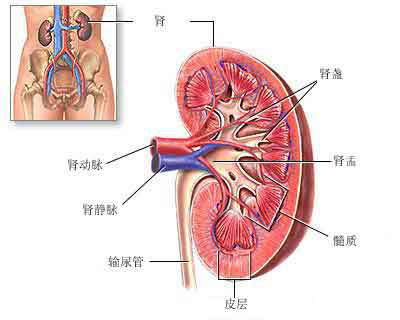"In this hospital, I feel like I’ve entrusted my life to a team, not just one person." Pracha (alias), a 65-year-old man from Thailand, who has been fighting cancer for over a decade, recently discovered nodules in his adrenal area during a follow-up examination, indicating a potential tumor recurrence. Without hesitation, he traveled thousands of miles back to Guangzhou Fuda Cancer Hospital, seeking treatment from Associate Director Dr. Long Xin’an.
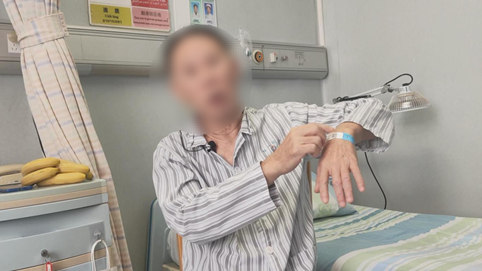
Pracha has much to say when it comes to cancer. He has narrowly escaped death multiple times, and the side effects of treatments once made him feel like life was unbearable, like he was just passing time. Fortunately, he persevered and found the right treatment for himself. Nowadays, he almost forgets that he is a patient, except for his regular check-ups.
Diagnosed with Kidney Cancer After Recurrent Back Pain
In 2007, Pracha began experiencing pain on the right side of his lower back. The local hospital initially treated it as muscle pain. However, as time went on, the pain worsened. When he could no longer bear it, he returned to the hospital for further examination. After a series of tests, the doctor told him: "You have kidney cancer!"
Back pain is common, so how could it be kidney cancer? Lower back pain is indeed one of the early symptoms of kidney cancer, but since back pain is so prevalent in daily life—often caused by poor posture—many people don't take it seriously. Additionally, blood in the urine and abdominal masses are other potential signs of kidney cancer. Since the kidneys are located deep in the back of the abdomen, tumors can go unnoticed for a long time. Therefore, when symptoms like these appear, further examinations should be conducted immediately.
Pracha underwent a right kidney resection, and the postoperative pathology report confirmed stage I kidney cancer. However, in early 2013, Pracha experienced back pain again—the tumor had recurred in his right kidney! After undergoing palliative surgery, there was still a tumor close to a blood vessel that could not be removed. The local doctors started him on targeted drug therapy. They warned him that if the drugs failed to control the tumor, he might only have four months left to live.
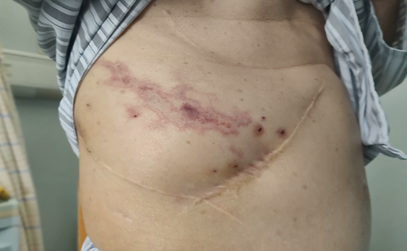
However, the side effects of the targeted drugs, including rashes, loss of appetite, and loss of taste, made life unbearable for Pracha. He even felt that the four months predicted by the doctors would be too long to endure. He began to hope for a new treatment that could reduce his suffering.
A Choice that Allowed Him to Live Peacefully for Ten Years
Through various channels, Pracha learned about Fuda Cancer Hospital's advanced treatments, such as cryoablation, NanoKnife, and iodine seed implantation. These treatments are minimally invasive, have fewer side effects, and offer faster recovery. Although these therapies were unheard of in Thailand, he didn't want to miss any opportunity, so in April 2013, he traveled to Guangzhou and sought treatment at Fuda Cancer Hospital.
Upon admission, further examinations revealed that the cancer had metastasized to his abdominal wall and retroperitoneal lymph nodes. Given the deep location of the retroperitoneal tumors, surgery was challenging. The doctors decided on a combined treatment of cryoablation and iodine seed implantation for his metastatic cancer. Alongside this, immunotherapy and targeted drug therapy were administered to enhance the body's immune response while targeting specific cancer cells, ultimately controlling and killing the cancer.
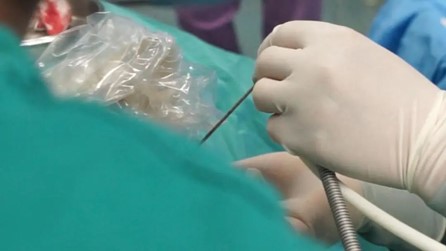
Cryoablation uses extreme cold to "freeze" tumor cells in a short amount of time, causing them to die. In addition to the "physical" attack by freezing, cryoablation also has a "magical" effect: when the tumor cells thaw, the tumor's internal antigens are exposed, stimulating the body's immune cells to recognize and attack the tumor. This can trigger a "distant effect," causing distant metastases to shrink or disappear.
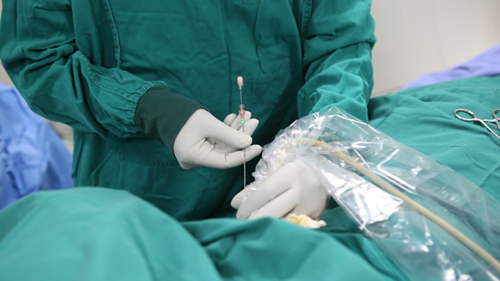
Iodine seed implantation, under the guidance of imaging equipment, places small radioactive seeds directly into or near the tumor. These seeds continuously emit low-energy radiation, precisely targeting and destroying cancer cells. This treatment is particularly beneficial for tumors that are difficult to completely remove through surgery or for patients who are not fit for major surgery. It offers high precision, minimal side effects, and little damage to surrounding tissues and organs.
Compared to the large incisions of traditional surgery, the minimally invasive techniques at Fuda Cancer Hospital, which involve only small needle punctures, greatly reduced the psychological and physical burden on Pracha. The careful explanations by the medical staff before and after each treatment provided him with immense comfort. He returned to the hospital for multiple treatments over the years and always placed complete trust in Fuda. By 2018, follow-up results consistently showed that his condition had stabilized, with the retroperitoneal lymph node metastasis shrinking significantly.
Returning to Fuda, Full of Confidence
After 2018, Pracha continued taking targeted drugs and underwent regular check-ups in Thailand, with his condition remaining stable. However, during a follow-up examination in January 2024, a nodule was discovered in his right adrenal area, highly suspicious of tumor recurrence. Upon receiving this result, Pracha immediately returned to Fuda Cancer Hospital for treatment. He knew that Dr. Long Xinan was well-acquainted with his medical history and trusted him implicitly.
Further examinations revealed metastases in the right abdominal wall and retroperitoneal lymph nodes, along with a nodule near his right adrenal gland that appeared to be a metastatic tumor. With Pracha and his family’s consent, Dr. Long performed cryoablation on the right adrenal area and the right side of the abdomen under the guidance of ultrasound and CT, reducing the tumor burden.
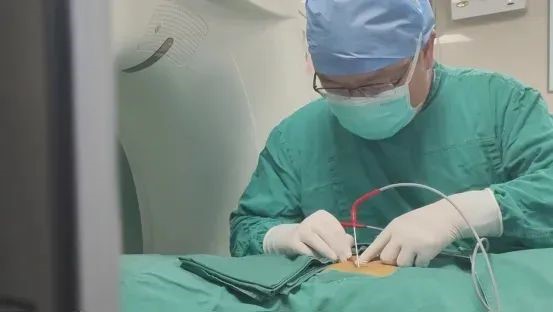
During the procedure, Dr. Long used a cryoprobe to puncture the target area and performed two cycles of cryoablation, monitoring the iceball to ensure it covered the tumor while avoiding damage to nearby intestines. After thawing, the cryoprobe was removed. For the tumor near the abdominal wall close to the intestines, Dr. Long used a PTC needle to inject anti-tumor drugs, minimizing the risk of damaging the intestines.
Now, having completed this stage of treatment, Pracha's condition remains stable. He believes that with the right treatment, a harmonious doctor-patient relationship, and an unyielding spirit, he can live another ten, even twenty years!
